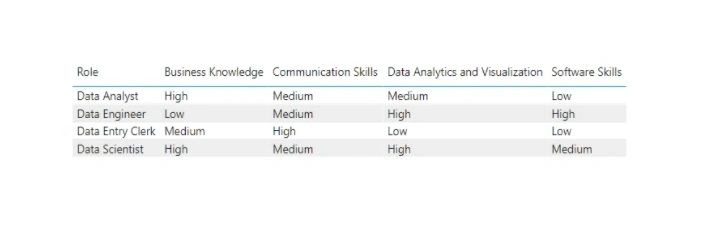Data Entry Clerk, Data Scientist, Data Analyst, Data Engineer
Who are they, why do we need them and who should employ them?
Today’s world is running on oil. That’s not correct. It’s running on data. The world daily generates 2.5 quintillion bytes of data as a result of the exchange of numerous emails, text messages, videos. From customer acquisition to end-of-year business review, data influences every process in every industry. Businesses across the globe make millions of dollars in investment to get the right resources (man and machine) in a bid to position themselves to make data-driven decisions. Companies in the United State are willing to pay an average salary of $120,931 for a data scientist whose job satisfaction is at 80%. An average salary of over $84,000 per year for data analysts in most U.S start-ups. Statistics show an estimated 11.5 million new data-science jobs by 2026 (source: U.S. Bureau of Labor Statistics)
In today’s data-driven world, there are various data needs to meet in every organization. The needs are quite cumbersome hence it is imperative to identify them and assign them to the appropriate talent/team member.
Data Entry Clerk

Who are they?
Data Entry is clerical work that entails taking charge of entering all the data into different computer databases using various processes like typing, voice recording. Data entry clerks usually compile, verify, sort and maintain records effectively. Most data entry work within a data team. This position can be considered as the first tier on the data team. While this role usually requires no special/technical skills, they usually play a pivotal role in a data team, especially in research-based projects.
Why do we need them?
They aid the data collection process especially if the process is not automated.
They build surveys for online and offline systems and follow through to ensure the information are entered correctly.
Who should hire a data entry clerk?
Small teams and organizations who want to embark on small research projects

Data Analyst
With the tonnes of data produced by the companies/businesses, there is a call to make sense from these data. A data analyst is someone who has the technical skills and knowledge to transform raw data lying in the databases to insights in the boardroom where executives can make data-driven decisions. Every data analyst must have a rich understanding of the business process and products to effectively deliver value in this role. Data analysts usually work on structured data and they use technical attitudes like problem-solving skills and technical tools like Power BI, Tableau, Excel for data visualization.
Why do we need them?
The ultimate aim of a data analyst is to aid data understanding and decision making. Top business executives may not be able to commit time to have a deep dive into the data available within the business; data analysts do this with ease.
Who should hire a data analyst?
Early start-ups or small-scaled organizations need a data analyst.

Data Scientist
The role of a data scientist can’t be overlooked by any human resource plans for a middle-large company. While most small businesses and start-ups seek the services of a data analyst, middle-large companies lookout for data scientists. A data scientist is a data analyst who has evolved from working with small structured data sets to large data sets. While data analysts focus primarily on data visualization, data scientists usually employ the use of scientific tools (NumPy, Pandas), methods/procedures (hypothesis construction and testing), algorithms (regression, probability, correlation) to extract meaningful trends and insights from a large dataset.
Why do we need them?
Every data scientist is responsible for data wrangling, analysis and initiating business data recommendation (proactive measures). While data analyst spends more time building dashboards and comparing actual performance with preset targets, data scientist usually develop models to suggest various business strategies like “what-if scenarios” to the executives.
Who should hire a data scientist?
A fasting growing business that generates thousands of rows of data that need to carry out customer segmentation, in-depth insights to unravel new business opportunities or threats needs a data scientist.

Data Engineer
The primary responsibility of a data engineer is to build infrastructure and pipelines for data generation. Essentially a data engineer must be able to design, build, validate, integrate and optimize data fetched from multiple sources. The skills needed for this role are Programming and Automation (Python, Scala, R, C#, Perl, Java), knowledge of distributed systems. operating systems and database systems (SQL and NoSQL), Data warehousing, basic machine learning, basic data visualization and communication skills. The services of data engineers could include writing production-level codes, reviewing data analyst/scientist processes as well as building tools that will aid their tasks.
Why do we need them?
The main responsibility of a data engineer is to make data accessible by building pipelines so that organizations can evaluate and optimize their performance from a data perspective.
Who should hire a data engineer?
An organisation that has multiple data sources with structured/unstructured datasets and different formats of data needs a data engineer. Any data warehouse with tables whose number of rows have exceeded one million rows would perform best with the services of a data engineer.

Figure 1: A Comparison of the different roles using certain attributes.
The demand for data solutions and the constant flux in titles in the space in the last decade has prompted organizations to seek help to meet their data needs. Companies must define their business needs, layout a data-road map in line with their business process, build a data-driven culture within the team and employ the right data professionals for the job. It is imperative to note that most professional wears different hats hence there is a chance you might have a “Merlin” in your team who ticks all the boxes.
Written By:
kpofure Enughwure